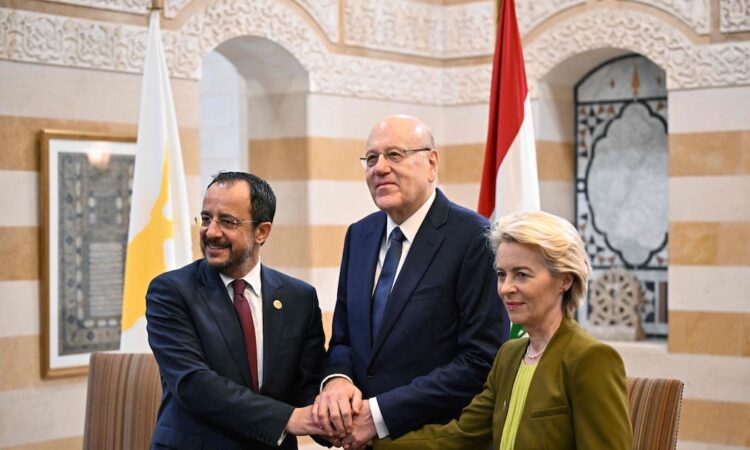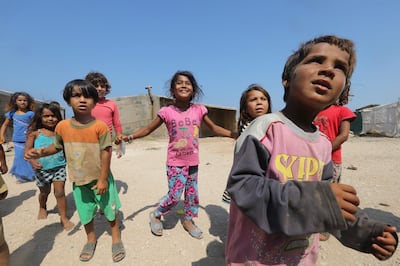
The €1 billion ($1.07 billion) financial package granted to Lebanon, without apparent conditions on reforms, has sparked wide criticism in the country, with some saying it is aimed at the Lebanese political elite to stem the flow of refugees into Europe.
The package, to be disbursed by 2027, was announced last week by European Commission President Ursula von der Leyen during her visit to Lebanon, with the aim of strengthening the country’s economy and cutting the number of refugees heading for Europe.
The International Monetary Fund (IMF), with which Lebanon has entered into a preliminary agreement for a $3 billion financial package, and other international donors, have consistently emphasised that the disbursement of aid hinges on a series of sweeping reforms.
However, vested interests among the political elite have so far prevented their implementation.
“The total absence of conditionality on aid is extremely shocking,” Karim Emile Bitar, professor of international relations at St Joseph University of Beirut, told The National, stressing that the funds might be “looted by the corrupt Lebanese political establishment”.
The package has been widely perceived as “a bribe”, he said, in exchange for Lebanon preventing Syrian refugees from reaching Cyprus, which lies only 260km off the Lebanese coast in the Mediterranean Sea.
Lebanon has been embroiled in a steep economic crisis since 2019, which erupted after decades of corruption, worsened by a migrant crisis and an explosion at Beirut port and, more recently, a border-conflict with Israel, which it is feared will escalate into a full-scale war.
The number of migrant attempts at crossing the sea from Lebanon has surged this year, with more than 3,000 people embarking on the dangerous trip between January and mid-April, compared to 54 over the same period last year, according to the UN.
Caretaker Lebanese Prime Minister Najib Mikati has denied the accusations, however. “It’s not a bribe as some claim; the €1 billion donation is not a condition for refugees to stay in Lebanon,” he said.
“We have made it a condition to the European Union that the aid not be granted to Syrians in Lebanon, but that it be an incentive for their return to their country.”
The announcement comes as Lebanon has intensified its crackdown on the approximately two million Syrians living in the country, as reported by Lebanese authorities, with 800,000 registered as refugees with the UN.

‘Free money’
“At present, this could be seen as free money,” a western diplomatic source told The National.
“This is in stark contrast to the previous stance of international donors, which have pressured for reforms.”
Lebanon’s caretaker Finance Minister Youssef Khalil has told The National the impact of the announced financial package could be hampered by corruption unless accompanied by reforms.
But the diplomat stressed a lot of uncertainty remains surrounding the deal and the announcement was “surprising and poorly co-ordinated”.
Mr Bitar said “the average amount in the past years was €250 million per year, the amount has not changed so much, she [Ms von der Leyen] is only trying to put a positive spin on it to aid in her re-election attempt.”
Yet the message sent by the EU “is quite disheartening”, he added.
“Lebanese government to play the role that was also assigned to North African despots, to be part of guarding the European border to prevent asylum seekers from reaching the shores of the EU.”
The EU has signed several of these cash-for-migration-curb deals in Tunisia and Egypt, including an $8 billion package for Cairo in March, which some have criticised for their lack of consideration for the root causes of migration and the protection of human rights.
“This could create a blackmailing dynamic: ‘If you don’t give us the money, we will open the floodgates of migration to Europe,’” the diplomatic source said.
“It will ultimately depend on how Lebanon uses the funds.”
General condemnation
Lebanese politicians from various parties have frequently called for the return of Syrian refugees, a highly sensitive issue in the country.
The aid package has sparked outrage across the entire political spectrum, primarily due to concerns that it might incentivise Syrians to remain in Lebanon.
“It has succeeded in alienating everyone due to the absence of any comprehensive plan to ensure that at least certain segments of the Syrian refugee population, those not facing immediate threats to their lives, can safely return to their safe areas,” Mr Bitar said.
Mufti Ahmad Kabalan, close to Iran-backed Hezbollah, has slammed it as “a poisoned” deal.
Gebran Bassil, the leader of the Free Patriotic Movement (FPM), denounced the deal as a plan “to replace the Lebanese people with Syrian refugees, to change the identity of the people and the territory”.
Mr Mikati has brushed off the criticism.
“We have set a condition to the European Union that the aid not be granted to Syrians in Lebanon, but rather that it be an incentive for their return to their country,” he said.
“We no longer hear from the EU that refugees must stay in Lebanon.”
‘Foreign policy tool’
Diana Menhem, managing director of the advocacy group Kulluna Irada, says the EU is advancing its own interests.
“This is a foreign policy tool. The EU has no interest in Lebanon completely collapsing and has an interest in keeping refugees away from the EU,” she told The National.
“The question is, what is Lebanon doing to advance its own interests?”
She highlighted several options the government could pursue to define a clear agenda regarding the Syrian refugees’ issue, such as refining the current UNHCR database to distinguish between economic migrants and political refugees, organising their presence and reinforcing control at the porous border.
“At the international level, Lebanon also has to define sustainable diplomatic action to ensure that return to Syria will be possible.
“We’re going to be subject to the policy priorities of others, rather than actually having the advantage of promoting our own policy as long as we don’t have economic autonomy.
“The disaster is that Lebanon doesn’t have a government that pursues the interests of the country.”
Updated: May 07, 2024, 3:00 AM






